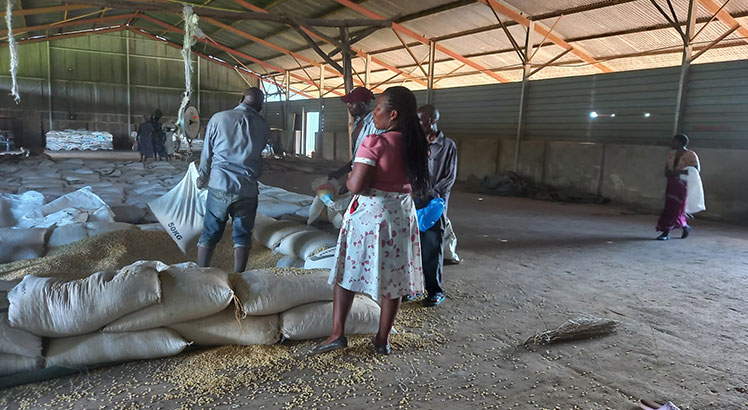Ministry tips farmers on mitigating El Nino impact
The Ministry of Agriculture has outlined measures to help farmers mitigate the impacts of El Nino induced dry spell that has affected maize and tobacco planted with the first acute erratic rainfall.
In a press statement issued yesterday and signed by Principal Secretary Dickxie Kampani, the ministry advises farmers to plant with the first effective rains, plant right.

He further recommends farmers to grow early maturing crops, utilise wetlands and use organic manure that will keep soil moisture as the adverse dry weather continues to hit the land.
However, in a telephone interview, Kampani acknowledged that lack of adequate financial resources is hindering the implementation of most agricultural interventions like investment in irrigation infrastructures.
He said: “The effects of El Niño are here. Farmers are encouraged to grow early-maturing crop varieties and to use organic manure, which helps retain water and moisture.
“In addition, farmers are encouraged to use box ridges to trap water when rainfall occurs and allow it to filtrate into the soil. Farmers should also utilise wetlands and available irrigation schemes.”
The PS said to reduce the risk of crop failure, farmers are also being encouraged to diversify crop enterprises through intercropping and planting drought tolerant crops such as cassava, millet, sweet potato and sorghum, sesame, cotton and sunflower.
“Construct rainwater harvesting structures such as check dams, gully plugs, contour bunds, box and tied ridges, swales, planting pits, infiltration ponds, and gabion structures,” says Kampani in the statement.
In a separate interview, Lilongwe University of Agriculture and Natural Resources agricultural economist Horace Phiri said time has come for both the government, the private sector and the farmers to seriously invest in irrigation farming as a long-term goal to reduce dependence on rain-fed farming which is easily affected by drought.
He expressed worry that dry spells continue to hit the country hard, causing damage in the fields of those who already planted their crops.
Said Phiri: “We have noted that there is damage in some fields. We need to understand that we must create independence from the rain fed farming as a long-term goal for the country. It is not something that can be achieved overnight, it requires investment.
“The time has come that we need to look at private investment. The farmers themselves should take up the initiative that farming is a business. Unfortunately, most of our farmers are resource constrained to invest in irrigation farming facilities. That makes it a long-term goal.”
He suggestedembracing low-cost farming technologies like soil and water conservation, proper choice of crops to grow can be utilised to create a resilient farming system and cushion farmers from the adverse impacts of the dry weather.
Since the onset of the dry spell, experts in the agriculture sector have urged the Malawi Government to implement mechanisms that will help the country respond to the forecasted El Nino weather during the 2023-24 growing season.
The Global Information and Early Warning System under the Food and Agriculture Organisation indicated that Malawi is among the 53 countries expected to be affected by El Nino-induced dry spells during the 2023-24 growing season.
The report further highlighted that, in sub-Saharan Africa, Malawi, Zambia, and Zimbabwe will be the most affected, with adverse conditions impacting cereal production.
According to the International Food Policy Institute (Ifpri), it is anticipated that there will be a decline in maize output due to the dry spell, potentially reducing gross domestic product (GDP) growth by 4.4 percent.
In its policy note titled ‘Mitigating the Impact of El Nino in Malawi,’ the institute also stated that the dry season typically following El Nino would reduce the total maize output by 25 percent, from the usual 3.4 million tonnes (MT) produced annually to 2.5 million MT.






9 Comments